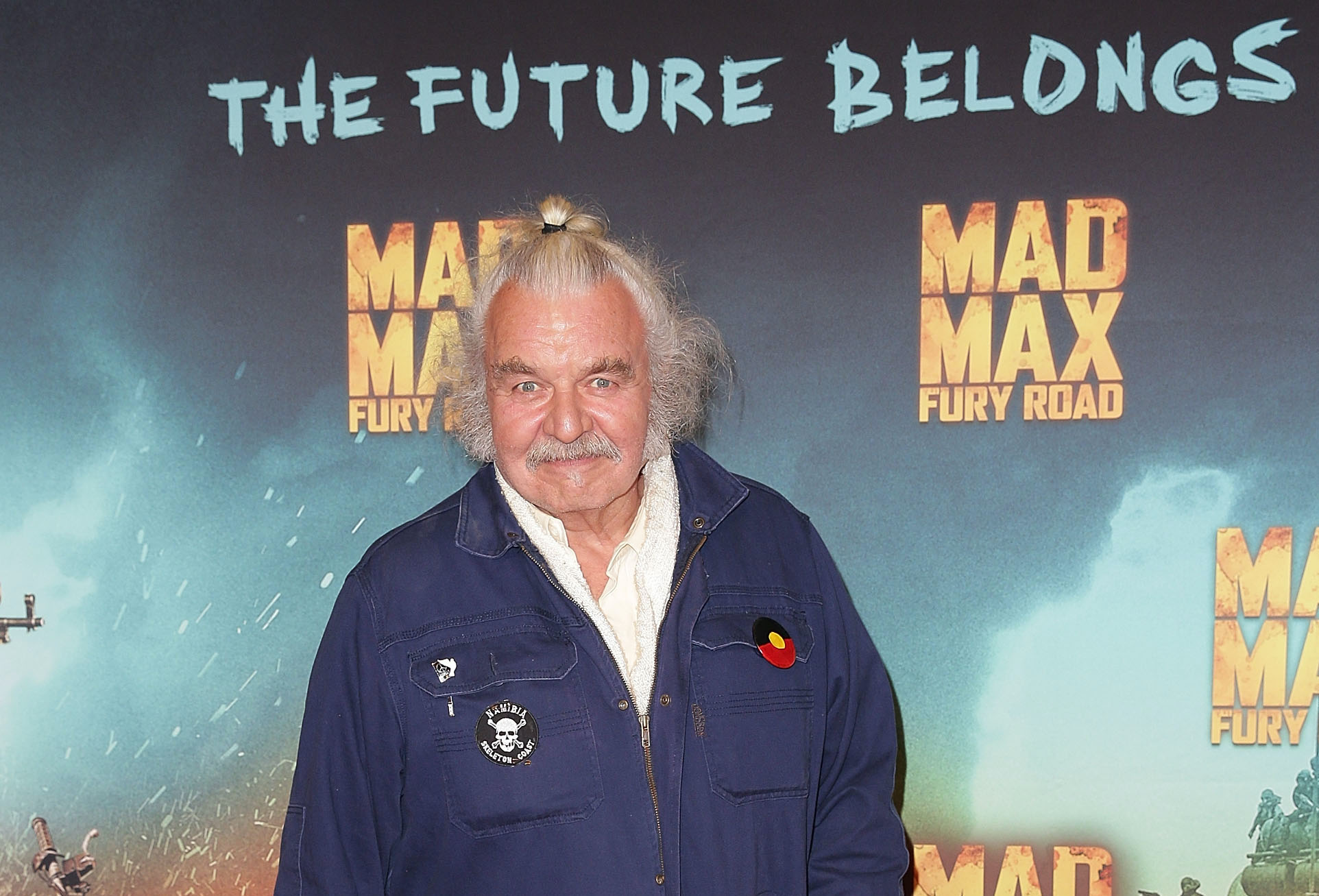Hugh Keays-Byrne Showed Us the Danger of Demagoguery and the Promise of Solidarity
The Mad Max veteran villain actor Hugh Keays-Byrne died last week. His performances took us to the demonic dark side of politics and showed that if we dare to struggle, we dare to win.

Hugh Keays-Byrne arrives at the Australian premiere of Mad Max: Fury Road on May 13, 2015 in Sydney, Australia. (Mark Metcalfe / Getty Images)
Acclaimed actor Hugh Keays-Byrne died this week at the age of seventy-three. Enthusiastic tributes to the kindness of a man known for his on-screen cruelty dutifully poured in. When director Brian Trenchard-Smith announced his friend’s death last Thursday, he wrote that Keays-Byrne “cared about social justice and preserving the environment long before these issues became fashionable. His life was governed by his sense of the oneness of humanity.”
Keays-Byrne was born in India, but moved to Australia in 1973 after touring there to perform. A member of the Australian actors’ union since day one, Keays-Byrne’s whole career was defined by films that explored the danger of right-wing demagoguery and the promise of solidarity politics.
Among his lesser-known roles, he played an aspirational antipodean führer in the adaptation of D. H. Lawrence’s Kangaroo, the communist leader Idris Williams in Strikebound, and a besuited company thug in Werner Herzog’s Where the Green Ants Dream. The latter enraged shrill critics at Cannes in 1984, who saw its depiction of a mining company using the legal system to steal land from Aboriginal communities as insufficiently patriotic. Keays-Byrne also directed and starred in the collective-minded sci-fi film Resistance, in which rough-as-guts working-class women team up to overthrow a military dictatorship in a dystopian future Australia.
Toad
It was Keays-Byrne’s breakout role in the sickening seventies road movie Stone that set him on a course to world renown as a deranged marauder. Keays-Byrne is sleazily gleeful as Toad, a biker who accidentally “witnesses” the assassination of an environmentalist politician while off his chops on drugs. His gang, the Gravediggers, are then picked off one by one by the conspiracy.
It’s a brutal ordeal for the unhinged outcasts and their more elite enemies: a more or less amoral, acid-fuelled adventure through a slimy place where the well-to-do throw tennis parties and the rest kill each other over drugs and beer. For contemporary audiences, the amorality is discombobulating. When two young toffs accidentally wind up in the Gravediggers’ favorite pub, Toad and Captain Midnight (Bindi Williams) homoerotically harass them out — a scene that’s simultaneously “inclusive” and nightmarish.
Toecutter
The vulgar Toad was the launching pad for Keays-Byrne to become, in the words of George Miller, “the glue that held the first Mad Max movie together.” As the bandit king Toecutter, Keays-Byrne leads a psychotic band of brutes through a collapsing Australia. Toecutter, with his foppish mane, insane accent, and wild eyes, is a fast and loose foil to the duty-bound, pre-maddened Max Rockatansky. The cataclysmic setting is the ideal stage for Toecutter to play out his theatrical women-hating fantasies, and Keays-Byrne puts real menace into this strutting sinner.
In one diabolical diorama, Toecutter and his horde pursue Rockatansky’s wife Jessie to a rural farm. They crucify a farmhand to a barn and steal Jessie’s baby. When she demands the child back, Toecutter delights in offering her a satanic swap: her severed hand for the kid. It’s a deal he has no intention of honoring, and everyone knows it. Keays-Byrne’s power-tripping performance is ecstatic: a lowlife who’s gazed into the void and caught a glimpse of himself as a decider of fates.
Immortan Joe
Keays-Byrne’s tyrannical trajectory culminated in his performance as Immortan Joe in 2015’s Mad Max: Fury Road. Toecutter may have had mythmaking aspirations (“That is his name. The Nightrider. Remember him when you look at the night sky!”), but Immortan Joe is the true realization of every budding fascist’s imperial dreams.
The film — which features a female warrior lead (Charlize Theron) to whom Max plays second fiddle — garnered intense publicity before its release thanks to a hysterical response from the dark misogynistic sewers of the internet. Max Rockatansky, incels whinged, had been turned into a feminist. Despite their claims to the contrary, it was clear that the character they truly identified with was not Max but Toecutter. And in Fury Road, he’d been elevated to the status of a vengeful emperor-god.
The corpulent and radiation-sickened Immortan Joe rules over a postapocalyptic desert kingdom where he sorts his subjects into deranged categories: war boys, breeders, polecats, milkers, and organic mechanics. In a world of terrifying scarcity, the Immortan has a monopoly over clean water. His cancerous warrior-devotees and the very unwell masses endure his messianic rants (“I am your redeemer, it is by my hand you shall rise from the ashes of this world!”) in exchange for anything to quench their thirst. Fed up, his head enforcer Furiosa takes off with several of his pregnant “wives” in search of sanctuary. Joe’s lily-white army follows in slobbering, snarling, screaming pursuit.
As vile as all this sounds, Keays-Byrne imbues the glowering Immortan with a sort of pathetic impotence. The bellowing and crazy-eyed Joe spends the entire chase being openly defied by his rebellious “property.” Whether it’s the elderly teacher Miss Giddy (“you cannot own a human being!”), the fleeing wives (“we are not things!”), or the vindictive rogue Furiosa (“remember me!?”), the dictator continually locks ferocious eyes with his “subjects” but fails to scare them into submission.
Keays-Byrne perfected the art of playing a particular kind of monster — megalomaniacal, misogynistic, monopolizing — but what was remarkable about his performances was the way he made clear where his sympathies truly lay. So vale, Keays-Byrne. You artfully terrified us with on-screen oppression, but made sure we always knew that — despite their monstrous bluster — all these fascists are bound to lose.